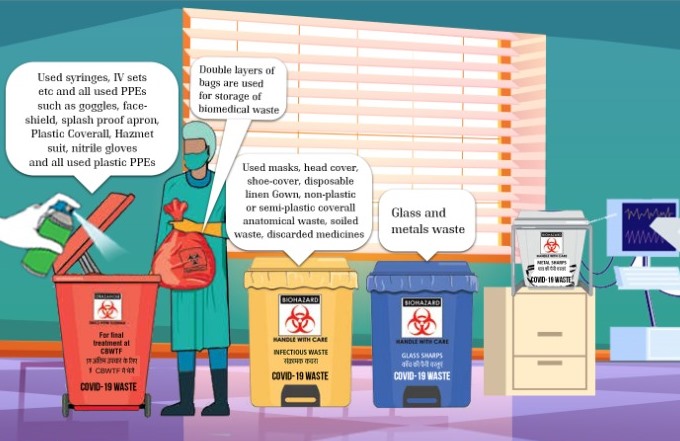CPCB Guidelines on COVID-19 Waste Management

India entered into lockdown 5.0 or Unlock 1 on 1st June 2020. Some major relaxations like re-opening of offices, malls, restaurants and religious places has followed. Since then, a regular spike in the number of COVID-19 cases is being observed every day. More than 2 lakh COVID-19 cases were reported across India on 7 June 2020, around 27,000 cases were recorded from the Delhi-NCR region alone.
What is more alarming is the fact that as the number of cases increase, so does the amount of biomedical waste generated. On 1 April 2020, a huge amount of biomedical waste was found lying in the open in one part of Delhi. Discarded face masks, tunics, gowns, caps and syringes were carelessly dumped. Moreover, reports suggest that Gurugram, which generates around 400 kg of COVID-19 waste per day, is not dumping biomedical waste properly.
The BMW (Bio-Medical Waste Management) Rule was updated in 2019 to take care of any kind of bio-medical waste generated in a medical or research laboratory. However, COVID-19 has posed a new challenge to India. The waste generated due to COVID-19 is highly infectious and requires extensive measures. As a result, CPCB (Central Pollution Control Board) has issued new guidelines on how to tackle COVID-19 waste. These are as follows:
- Healthcare facilities which have COVID-19 dedicated isolation wards, must keep separate colour-coded bins/ bags/ containers in the wards, make sure that COVID-19 waste is stored in a separate bin labelled as COVID-19 and maintain proper segregation of waste as per BMW rules.
- The inner and outer layer of the bins/ containers/ trolleys should be disinfected with 1% sodium hypochlorite solution daily. Separate dedicated sanitation workers should be assigned to collect bio-medical and general waste.
- Faeces of COVID-19 patients should be treated as bio-medical waste and be stored in a separate yellow bin/ container. In case a bedpan is used, then faeces need to be first washed into the toilet, cleaned with a neutral detergent and water, disinfected with a 0.5% chlorine solution, and then again rinsed with clean water.
- Used masks, head cover/cap, shoe-cover, disposable linen gown, non-plastic or semi-plastic coverall should also be placed in yellow bags.
- Red bags should be dedicated for used PPEs like goggles, face-shield, splash-proof apron, plastic coverall, hazmat suit and nitrile gloves. Viral transport media, plastic vials, vacutainers, Eppendorf tubes, plastic cryovials and pipette tips should be first pre-treated as per the BMW rules and then collected in Red bags.
- In Quarantined Camps/ Homes, the bio-medical waste generated should be placed in a yellow coloured bag and then handed over to the authorized waste collector.
- Used masks and gloves generated should be first kept in a paper bag for a minimum of 72 hours before disposing of the same as general waste. To prevent re-use of these masks, it is advisable to cut these masks and then dispose them off.
- The CBWTF (Common Bio-Medical Waste Treatment Facility) needs to ensure that sanitation workers are regularly sanitized, provided with adequate PPEs and are granted with enough leaves if suspected with COVID-19.
- Dedicated COVID-19 vehicles should be sanitized with sodium hypochlorite or any other appropriate chemical disinfectant after every trip.
- In case the rural or remote areas do not have access to CBWTFs, existing captive facilities of any hospital can be used to dispose of COVID-19 waste.
- If the yellow-coloured bin stores a large volume of COVID-19 waste, then these can be incinerated at the existing TSDFs (Treatment, storage and disposal facility).
- The waste collectors need to be adequately trained by the ULBs (Urban Local Bodies) in handling the bio-medical wastes.
- The agencies operating Sewage Treatment Plants need to ensure that wastewater is disinfected so that the risk of COVID-19 infection is reduced.
- Awareness needs to be created among the masses on how to handle COVID-19 wastes.
Unscientific disposal of COVID-19 generated bio-medical waste can cause numerous diseases like gastrointestinal infection, respiratory infection, viral hepatitis type A, B and C, just to name a few. The discharge of toxins from these biomedical wastes can potentially affect the environment.
Transmission of various communicable diseases due to infected syringes and needles can prove fatal to humans and create another epidemic, if not pandemic, like situation. It is therefore best that all concerned follow these guidelines to ensure that we can soon overcome COVID-19 forever.



